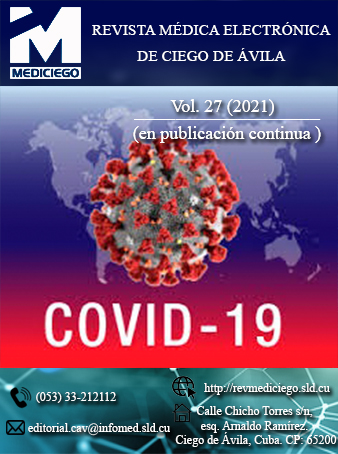Educative intervention to help permanent first molar´s health, in mentally retarded children
Abstract
Introduction: the partial, total, or loss of the first permanent molars has a negative impact on maxillofacial development and growth. To avoid it, proper oral hygiene is essential.
Objective: to evaluate the effectiveness of an educational intervention to modify practices that are detrimental to the health of the first permanent molar in children with mental retardation.
Methods: a quasi-experimental study was carried out in children with mental retardation, enrolled in the Special School "Nguyen Van Troi" of Camagüey municipality, during the period from September 2016 to March 2017. It worked with a population of 26 children with mild and moderate mental retardation, who did not present hearing or visual disorders, whose parents or guardians signed the informed consent for their participation in the research. The research consisted of three stages: diagnosis, educational intervention and evaluation. Ethical principles were met
Results: 65,38 % had first permanent molars in satisfactory condition and 34,62 % unsatisfactory. Before the intervention, 69,23 % had poor levels of information about oral health, oral hygiene in 76,92 % was poor, and in 23,10 %, regular. Afterwards, 38,46 % registered good levels of information, 46,15 % regular, and 15,38 % bad. Oral hygiene was good in 26,92 %of the children, regular in 50,00 % and poor in 23,08 %. Of these last, four presented levels of information classified as bad.
Conclusions: the educational intervention was effective in modifying practices harmful to the health of the first permanent molar in children with mental retardationDownloads
Published
How to Cite
Issue
Section
License
Copyright (c) 2022 Lilliam María Ramón Leiva

This work is licensed under a Creative Commons Attribution-NonCommercial 4.0 International License.
Those authors who have publications with this journal accept the following terms of the License CC Attribution-NonCommercial 4.0 International (CC BY-NC 4.0):
You are free to:
- Share — copy and redistribute the material in any medium or format for any purpose, even commercially.
- Adapt — remix, transform, and build upon the material for any purpose, even commercially.
The licensor cannot revoke these freedoms as long as you follow the license terms.
Under the following terms:
- Attribution — You must give appropriate credit , provide a link to the license, and indicate if changes were made . You may do so in any reasonable manner, but not in any way that suggests the licensor endorses you or your use
- No additional restrictions — You may not apply legal terms or technological measures that legally restrict others from doing anything the license permits.
The journal is not responsible for the opinions and concepts expressed in the works, which are the exclusive responsibility of the authors. The Editor, with the assistance of the Editorial Committee, reserves the right to suggest or request advisable or necessary modifications. Original scientific works are accepted for publication, as are the results of research of interest that have not been published or sent to another journal for the same purpose.
The mention of trademarks of specific equipment, instruments or materials is for identification purposes, and there is no promotional commitment in relation to them, neither by the authors nor by the editor.






















